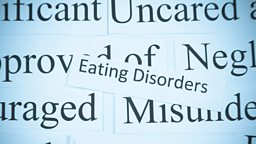Gemma, Dr Radha and Newsbeat's Anna talk about eating disorders and anorexia on the Radio 1 Surgery

Eating disorders affect everyone
Newsbeat's 'A Boy In A Girl's World' documentary looks at the story of Charles, a teenager going through the difficult process of recovering from an eating disorder.
Charles' recovery was made more complex by his gender. Parents, friends and medical professionals are less familiar with eating disorders in boys and the signs often aren't spotted - Charles had no idea he was ill until he collapsed and was rushed to hospital
Treatment spaces presume that men and boys don't get eating disorders. Charles was the only boy in the specialist eating disorder unit at the Royal Free Hospital where the documentary was filmed.
"One of the very first things we do, other than breathe, is feed"
The Radio 1 Surgery discussed eating disorders this week, after Charles' documentary. Dr Radha, Gemma Cairney and Anna Collinson from Newsbeat (who worked on the programme) got deep about why we experience issues with food and what can help.
Food has this really emotional trigger to it and a really comforting sense to it that can be sometimes a bit destructive.Dr Radha
Gemma asked Dr Radha why humans get eating disorders-
Gemma: We need food to survive, don’t we?
Dr Radha: Yep, absolutely.
Gemma: But we do internalise and indeed externalise bizarre and obsessive behaviour or sometimes uncontrollable behaviour when it comes to eating.
Dr Radha: Yes, we do, definitely. And I think it’s because one of the very first things we do, other than breathe, is feed. We have a very close relationship with food – we need food every single day of our lives to stay healthy but what seems to happen with humans is that sometimes when we get distressed or don’t quite know how to cope we kind of use food or our relationship with food changes a lot. From being a healthy one to being potentially one that’s quite destructive, in extreme cases.
But I think all of us can recognise, listening tonight, those times when perhaps we’ve felt a bit emotional or a bit upset and perhaps we’ve comforted ourselves with eating something or we’ve eaten something we don’t necessarily normally eat. Food has this really emotional trigger to it and a really comforting sense to it that can be sometimes a bit destructive.
I say to them "Actually this is very common"
Gemma: Eating disorders; there are so many different types, aren’t there?
Sometimes it's really hard not only for ourselves but for people around us, like our family and friends, to actually recognise an eating disorder and when I see patients in my surgery often they feel guilty, family or friends, for not picking it up earlier.Dr Radha
Dr Radha: Yes – the common ones that we talk about are anorexia, bulimia, binge-eating disorder and then there’s Eating Disorders Not Otherwise Specified (ED-NOS), the ones that are kind of a mixture of all those different types.
Gemma: Would it be fair to say that in this modern world that a lot of our mental health issues, which includes our relationship with food, are quite convoluted and mixed and sometimes a big tangle and quite hard to define?
Dr Radha: Yeah, definitely. I think it’s very difficult to see, as well, what’s going on with yourself unless you kind of step back and become aware of it. Often, unfortunately, that doesn’t happen until you get to the point where there are some destructive patterns there. It’s definitely harder to unpick, harder to see – everyone’s racing around doing different things and activities with different stressors. So sometimes it’s really hard, not only for ourselves but for people around us, like our family and friends, to actually recognise an eating disorder and when I see patients in my surgery often they feel guilty, family or friends, for not picking it up earlier.
I say to them actually this is very common. It’s very hard to see what’s going on because it can be so hidden and can go on for such a long time before it’s noticed.
Gemma: When I’m thinking about how I want to change and save the world I feel a bit overloaded and a bit helpless. But one thing that does help and that makes me very proud of this show, not from a self-righteous perspective but from all of us in it together is that what does make you feel better sometimes is not necessarily the definitive, not necessarily a diagnosis but just hearing from other people that are feeling similar, other people that are feeling confused, other people that are feeling maybe a bit lonely in their problem and just hearing the different experiences that human beings have when it comes down to certain problems.
You can definitely get over eating disorders with the right support
Gemma: When you’ve had anorexia do you always have anorexia? It’s a bit like alcoholics will say they’re still alcoholics even when they’re not drinking or smokers talk about still always wanting a cigarette. Is this a similar notion?
I’ve seen loads of patients of my own get a lot better, come out of it and be really a lot stronger and much more resilient after they’ve actually been through a treatment programme.Dr Radha
Dr Radha: Everyone’s different but I think it’s fair to say that if you have suffered from anorexia in your life it will always be there. And if you have stress or big changes in your life it is likely that you may have a little step back into it because that’s a coping strategy that you learnt – you learnt it, in a way, to cope with distress. So it’s true to say that that will be there throughout your life but that doesn’t mean that that will happen, that you’d go back or that you won’t ever come out of it. It just means you have to be a bit more aware of yourself and aware that that is a pattern that you can default into, that’s all.
You can definitely get over eating disorders with the right support, the right help. I’ve seen loads of patients of my own get a lot better, come out of it and be really a lot stronger and much more resilient after they’ve actually been through a treatment programme.

"It doesn’t matter about your gender, your age, your race, people get eating disorders"
Anna from Newsbeat came into the studio to talk about making the documentary 'Anorexia: A Boy In A Girls' World'.
It’s not that men don’t get eating disorders, it’s that they don’t know they have them or they don’t know how to go about getting helpAnna Collinson
“When we first started looking into it, we looked into hospital admission numbers for across the UK and there are more women who are admitted for it than men, a vast majority more. But then when you look further into it, by the time the men are being admitted they’re far more ill, which suggests that they’re not getting help early enough, that they’re not getting treatment and that they either don’t know or don’t want to address their problem.
And that’s something that really surprised me – it’s not that men don’t get eating disorders, it’s that they don’t know they have them or they don’t know how to go about getting help. In fact a lot of surveys suggest and research shows that up to a quarter of people with eating disorders are male, which is so much higher than I would have ever thought.
And I think the really important thing about this doc, about talking about it today, is to make people realise that it doesn’t matter about your gender, your age, your race, people get eating disorders. Certain groups maybe are more likely but anyone can get one. And we need to talk about it and get help as soon as possible.”

Gemma, Dr Radha and Anna answered your questions:
As soon as you walk into that GP's room and you tell them that you think you have an issue, you will feel so relieved"Dr Radha
“Hi Gemma and Anna and Dr Radha. I think I have a binge eating disorder since I started my job last year. I have gained a considerable amount of weight and I eat secretly a lot of the time but I’m too afraid to go and see my GP. How do I get over the embarrassment of binge eating and go and see my doctor?"
Gemma: We were just talking about that, about going to see a Doctor – why is it such a thing that we’re so afraid of?
Dr Radha: I think it is difficult, I think we have these ideas about what’s going to happen and whether we’re going to be judged and perhaps about confidentiality. I can definitely reassure people about confidentiality because that’s not an issue at all.
But I think also sometimes it seems like such a big step to go and say, out loud, to a health professional “I think I have an eating disorder.” So sometimes it’s not about the doctor or the GP but about us not wanting to say those words out loud, because it’s a scary thing and we don’t know what it means and we don’t know what’s going to happen to us.
But what I would say to you is if you have noticed that you are eating a lot and bingeing – and we use the word ‘bingeing’ a lot in normal conversation but when we’re talking about binge eating disorder we’re talking about eating so much food in such a short space of time that you feel very uncomfortably full, you really feel ill from eating so much. If that’s what you feel you have then talk to a friend, get a friend to come with you. Talk to your parents, ask them to go with you.
Do whatever it takes but as soon as you walk into that GP's room and you tell them that you think you have an issue, you will feel so relieved. You'll feel more in control because actually things can then start to get going and they can support you and help you."

























